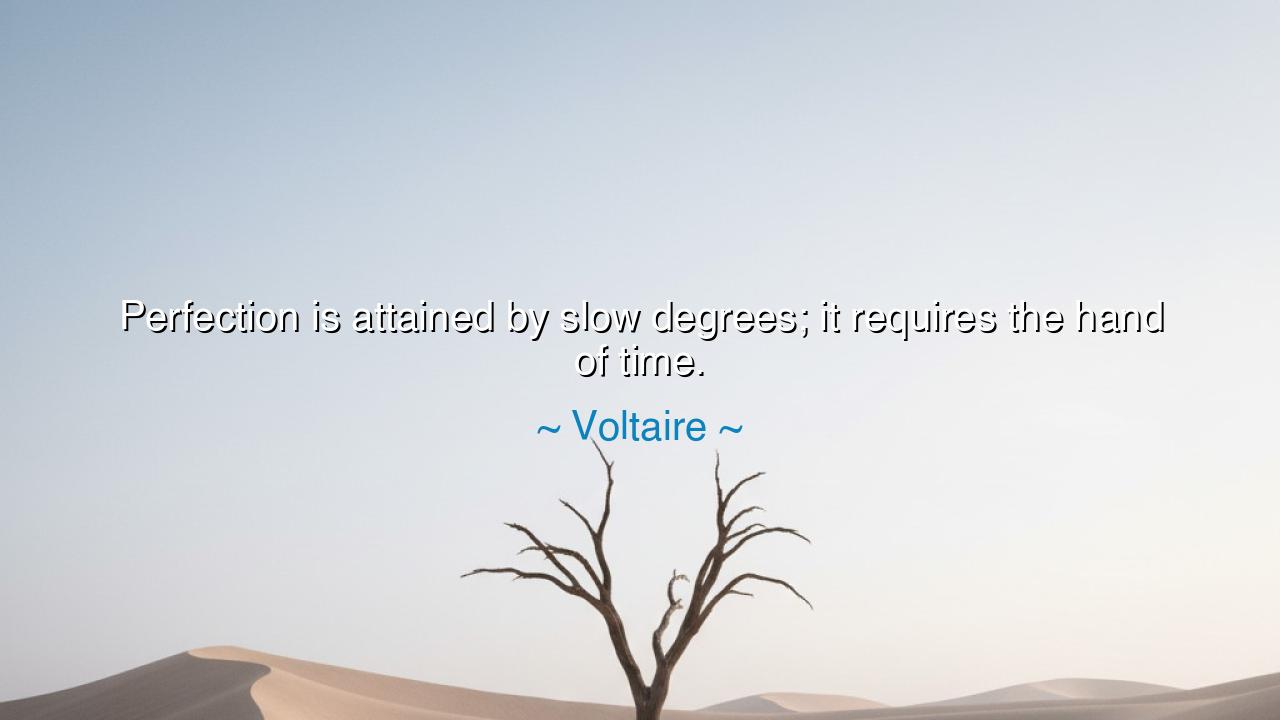
Perfection is attained by slow degrees; it requires the hand of






Hear the voice of Voltaire, sharp thinker and luminous spirit of the Enlightenment: “Perfection is attained by slow degrees; it requires the hand of time.” In this phrase, the philosopher teaches that greatness is never seized in haste, nor is excellence born in a single hour. It is shaped by the patient chisel of time, the steady hand that polishes, and the endurance that refines rough beginnings into noble ends. What is swift may dazzle, but only what is patient endures.
The meaning is profound: perfection is not a single act, but a process, a slow unfolding, a series of struggles and triumphs strung together across years. To demand immediate greatness is to misunderstand the very nature of growth. Just as the oak begins as an acorn, hidden and fragile, so too does every art, every craft, every soul pass through stages before it reaches its full glory. The hand of time is the unseen companion of every achievement.
Voltaire himself was no stranger to this truth. His own life was filled with exile, criticism, and toil. His writings, which shook kingdoms and reshaped the world’s thoughts, did not spring forth fully formed. They were honed by long years of reflection, resistance, and persistence. His wisdom came not from sudden inspiration, but from enduring the passage of time, where failures became lessons and struggles became strength.
History, too, bears witness. Think of the cathedrals of Europe, those vast testaments of stone reaching toward heaven. They were not built in a single lifetime; many took centuries to rise from foundation to spire. Generations of workers carved their lives into those walls, never to see the final glory with their own eyes. Yet the patience of time gave birth to works of perfection that endure as symbols of human devotion and aspiration. Their beauty is the triumph of slowness, of the hand of time guiding countless hands of men.
The same truth is found in the life of Mahatma Gandhi. His quest for freedom for his people was not achieved in a sudden revolt but through long years of sacrifice, protest, imprisonment, and perseverance. Each step seemed small, each advance incomplete, yet in the weaving of many patient moments, a nation was born anew. Gandhi’s triumph was the victory of slow degrees, the proof that true change requires endurance.
Thus, the lesson is clear: do not despair when progress is slow, nor be deceived by the false glitter of haste. Perfection is not denied you; it is merely ripening. To walk the path of greatness is to walk with patience, to trust that each small effort, each careful step, is part of a larger unfolding. Just as the sculptor chips away day by day until the marble reveals its hidden form, so must you labor faithfully, allowing time to shape your work.
Practical actions follow from this teaching. Set your eyes upon your long vision, but take joy in small advancements. When frustration tempts you, remember that all things noble require patience. Embrace discipline, practice daily, learn from failure, and above all, persist. Let not haste be your master, for haste births ruin, but let patience be your guide, for patience leads to excellence.
So remember, children of tomorrow: the crown of perfection cannot be seized in a single grasp. It is bestowed only upon those who endure, who trust the hand of time, and who understand that the slow degrees of growth are the very steps to eternity. Walk steadily, and in due season, what you labor for shall shine with the brilliance of the everlasting.






AAdministratorAdministrator
Welcome, honored guests. Please leave a comment, we will respond soon